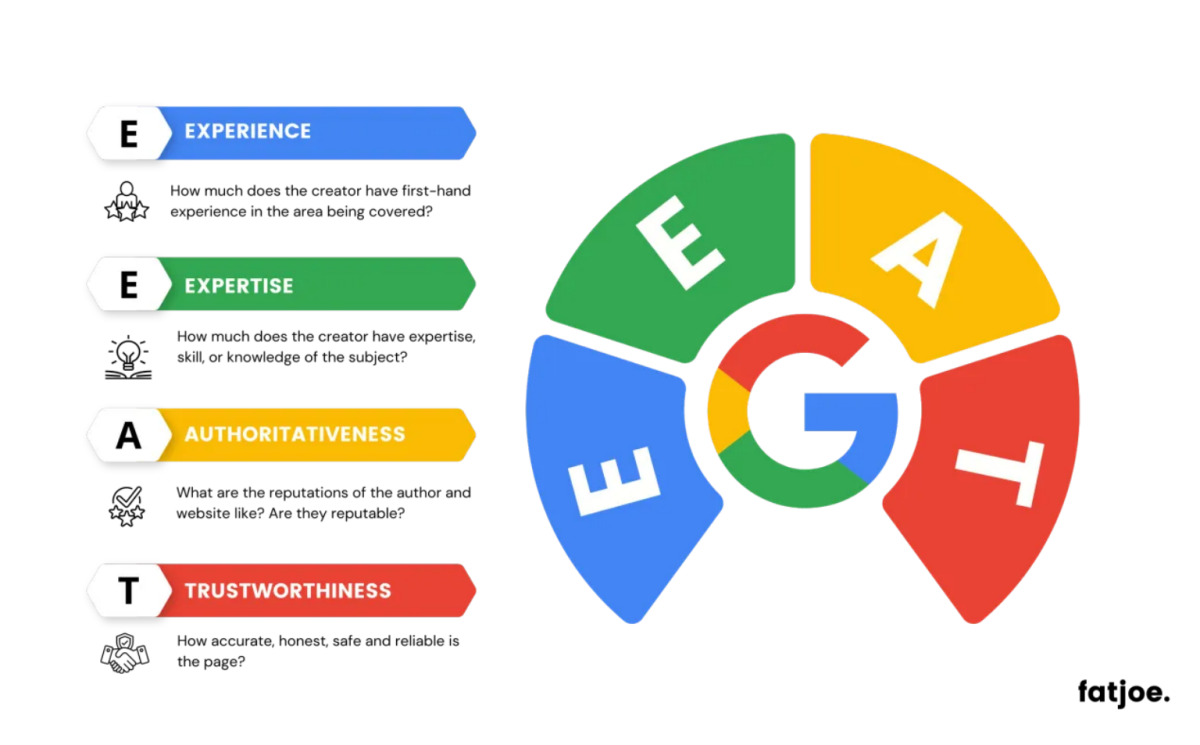SEO対策のためのAIコンテンツ人間化ガイド2026
humanize AI content for SEOが成功すると、それはまるで人が書いたようにテキストが自然で興味深く、信頼感を両)readerと検索エンジンに与えるようになります。AIツールは企業にこれまで以上に多くの文章を書くのを助けています。しかし問題があります:AIは大量の文章を作成することができるにもかかわらず、それがリアルに感じる場合のみうまく機能します。AIの文章は、あなたのウェブサイトが検索結果でもっともしばしば高く表示されるのを助けるために、人々とつながる必要があります。これにより、あなたの会社に実際のビジネス成果がもたらされます。
これまで以上に多くのことがプレイされています。最新研究によると、米国のGoogle検索の58.5%がユーザーがどのウェブサイトもクリックしないまま終了し、すべてのクエリの13.14%がAI概要で結果となっていることを意味します。これは、AIの文章がますます激しい状況に突破する必要があることを意味します。この究極のガイドでは、AIの文章をまるで人が書いたようにしてSEOで勝ち、時間をかけて有機交通を増加させる方法を正確に示します。
ヒューマナイザーに本当に投資する価値があるのか、迷っていませんか?当社の実践レビュー GPTHumanizer AI は本当に使えるのか?(2026年版) では、その性能やメリット・デメリット、さらには手動での修正が必要な箇所まで徹底解説します。
Googleの現在のAIコンテンツポリシーを理解する

Googleの公式的なAIコンテンツに対する見解は過去数年で劇的に変わりましたが、これらガイドラインを理解して適切にAIコンテンツを人間化する必要があります。
Googleによると、「AIや自動化の適切な使用は私たちのガイドラインに反対ではありません。これは、主に検索ランキングを操作するためにコンテンツを生成するために使用されるため、それは私たちのスパムポリシーに反対です。」
検索の巨人は、原点よりも質を強調しています。Googleはコンテンツが「専門性、経験、権威性、信頼性を示す品質を示すこと」を要求し、「自動化の使用、AIを含むすべてがスパムであるとは限りません。」と指摘しています。
しかし、多くのコンテンツクリエイターが見逃す重要な違いがあります。2025年のGoogle品質評価者更新では、AI製のコンテンツが「最低」評価を受ける可能性があることが明確になりました。それは、常にAIの仕事の人間のレビューと、実践と原則でのタスク固有の改善がなければならないことを示しています(リンク)。これは、AIコンテンツがデフォルトで罰せられるわけではないが、低品質のAIコンテンツは単に無視されるのではなく、ダウングレードされるという考えを物質的に支持しています。
重要なのは、GoogleがあなたのコンテンツがAI製であるかどうかを気にするのではなく、あなたのコンテンツが価値がある、オリジナルである、ユーザーの意図を達成するかどうかです。だから、AIの文章を人間化することはSEOに役立つだけでなく、100%必要です。
AIコンテンツ検出によるSEOパフォーマンスの実際的な影響
AI検出があなたのコンテンツのSERPパフォーマンスに与える影響を理解することは、コンテンツ戦略をSEOに関連させるために不可欠です。GoogleはAIコンテンツを罰せたり気にしないと言いたって、SERPsはあなたにそうではないことを示します。
検索と第三者ツールが使用する検出モデルは、これまで以上に高度で、文の構造、語彙、論理的发展、文脈などを探しています。これらは、純粋な生のAIコンテンツが簡単に拾われ、AIの文章を人間化することがSERPのパフォーマンスから見た重要な理由です。
最も重要なのは、ユーザーのエンゲージメントメトリックで、SERPパフォーマンスで最も重要なレバーの1つが、純粋な生のAIコンテンツに対して人間化されたコンテンツに対して一貫して強くなることです。あなたのコンテンツが人間のように読まれ、あなたの個人的なパフォーマンスに関する挿入を含め、ユーザーにとって実際の課題に対処するのであれば、ページに滞在時間が長くなり、バウンス率が低くなり、より多くのソーシャル共有を得ることができます。
GPTHumanizerでAIコンテンツを変換する
効果的にAIコンテンツを人間化し、SEOの目標を達成するためには、適切なツールを選ぶことが重要です。それは、プロのAI人間化ツールにターンする方がよい時です。
GPTHumanizer は、AI で生成された大量の文章を、Google で上位にランクインするような自然で人間らしい文章に書き換える必要があるコンテンツクリエイター、マーケター、SEO エキスパートにとって理想的な、高度な AI ヒューマナイザーツールです。手軽で簡単な始め方をお探しなら、単語数無制限の最高の無料 AI ヒューマナイザー をご利用ください。会員登録が不要なため、プロ仕様の書き換えエンジンがあなたの下書きをどのように高品質なコンテンツへと変換するのかを、すぐに試すことができます。
GPTHumanizerは便利に異なる人間化モードを含んでおり、コンテンツのタイプと書き込みの目的に応じて設定できます。だからこそ、ブログ記事やウェブコピー、製品説明、マーケティング資料のAI生成コンテンツを人間化したい場合に、このツールは自動的に書き直すことができ、あなたのブランドの声を維持しながらSEOを最適化します。それは知能的な文の再構成、語彙の強化、自然なフローの最適化、そして強制的な感じをしないキーワードの統合を特徴としています。
さらに強力なのは、人間化プロセス中のSEO最適化への重点です。それはコンテンツをより人間的なものにするだけでなく、Googleが好きなことを改善します:コンテンツの深さ、専門性シグナル、自然な方法でのキーワード統合、ユーザーエンゲージメントシグナル。あなたが作成するコンテンツは自然に読まれながら、検索結果でもよりよくランクインします。
AI文章をより良いSEOのために人間化するための証明された技術
AIコンテンツの人間化を成功させるには、SEOの技術的な要件と人間によるエンゲージメント要素の両方に対応した戦略的なアプローチが必要です。2026年に向けた高度なAIライティング人間化戦略を導入することで、進化し続ける検索アルゴリズムの先を行くことができます。以下に、安定した成果をもたらす最も効果的な手法を紹介します。
コンテンツ構造とフローの強化
文章の長さと構造を変化させることで開始します。AIコンテンツは予測可能なパターンに従う傾向があります—短い文章、長い文章、中間の文章—しかし、人間が書いた文章は自然に変動します。複雑な文章と単純な文を混ぜ合わせ、会話的な遷移フレーズを使用し、読書力を高めるためにアイデア間の論理的ブリッジを作成します。
コンテンツ全体に個人的な洞察と現実世界の例を追加します。小売業と消費者空間のビジネスの80%以上は2025年までにAI自動化を使用する予定ですが、最も成功しているのはAIの効率性と人間専門知識を組み合わせるものです。業界の観察、個人的な経験、または本物の知識と権威を示すケーススタディを含めます。
SEO固有の人間化戦略
キーワード統合は完全に自然に感じるべきです。キーワードを予測された位置に強いて入れるのではなく、意味と読書力を高める場所にコンテンツに織り交ぜます。トピックの専門性を示すセマンティックバリエーションと関連する用語を使用して、キーワード詰め込みを避けます。
人間の心理学を反映する魅力的なメタディスクリプションとタイトルタグを作成します。検索ユーザーは決定を下す人です。だからこそ、あなたのタイトルは彼らの特定のニーズと感情に対処し、ターゲットキーワードを自然に組み込むべきです。
品質と権威シグナル
最新のデータ、統計、専門家意見でコンテンツを強化します。AIマーケティング市場は2025年に472億3200万米ドルの価値があり、36.6%のCAGRで成長すると予想され、この空間の急速な進化を示しています。業界の発展とフレッシュな洞察を最新に保ち、専門性を示します。
AIが通常避ける意見に基づく声明と主観的な分析を追加します。業界のトレンドに立ち向かい、経験に基づく推奨事項を提供し、思索指導を示す予測や洞察を含めます。これらの要素は、検索エンジンにコンテンツの背後に人間専門知識があることをシグナルします。
トピックが全体として分析され、単純なGoogle検索で見つけることができる以上の洞察を提供することを確認してください。検索エンジンはトピックのすべての側面を深くカバーするページを報酬付けるので、サブトピック、関連情報、読者が答えを知りたい一般的な質問をコンテンツに含めようとします。複雑な科目を明確に説明し、あなたの専門性和理解を示すアクション可能な要点を提供してください。
結論
SEOのためのAIコンテンツの人間化は、コンテンツの品質を最適化して読者をより深くエンゲージし、検索ランキングを改善することです。このガイドの戦略は、Googleの既存ポリシーを理解することから、上記の人間化技術がなぜ機能するのか(そしてそれらを実装する方法)まで包括的なロードマップを提供します。
今では誰でも同じAIツールにアクセスできますが、大きな競争優位は、それを効果的に専門家の人間的監視と組み合わせることができる人々にあります。品質、本物性、ユーザーへの価値は、Googleでランクインするときに常に最終的に勝つでしょう。あなたは検索でのチャンスを改善するだけでなく、読者から欲しい結果と信頼を得ます。今日からGPTHumanizerでAIの文章を人間化し、曲線を先取れます!
Related Articles

Semihuman AI レビュー 2026:機能、価格、比較
Semihuman AIの徹底レビュー:機能、価格、メリット&デメリット、そしてGPTHumanizerとの比較表つき

QuillBotのAI Humanizerレビュー2026:機能、価格、比較
2026年のレビューで、QuillBotのAI Humanizerがあなたに合うかどうかを見極めよう。機能、価格、そしてGPTHumanizerの深い書き換え技術との比較からメリット・デメリットまで徹...

Stealth Writer AI レビュー 2026:機能、価格、比較
Stealth Writer 2026 Ghost Proの回避率と全機能を徹底解説。多層モデルを解剖し、実世界のAI検出結果を検証する。

HIX Bypass AI レビュー 2026:機能、価格、比較
2026年、HIX Bypass AIの詳細かつ客観的なレビュー:機能、価格、書き換え品質、長所と短所、実際のユーザー評価、そして無制限無料Liteモデルを備える最強の深層リライト・ヒューマナイズツー...
